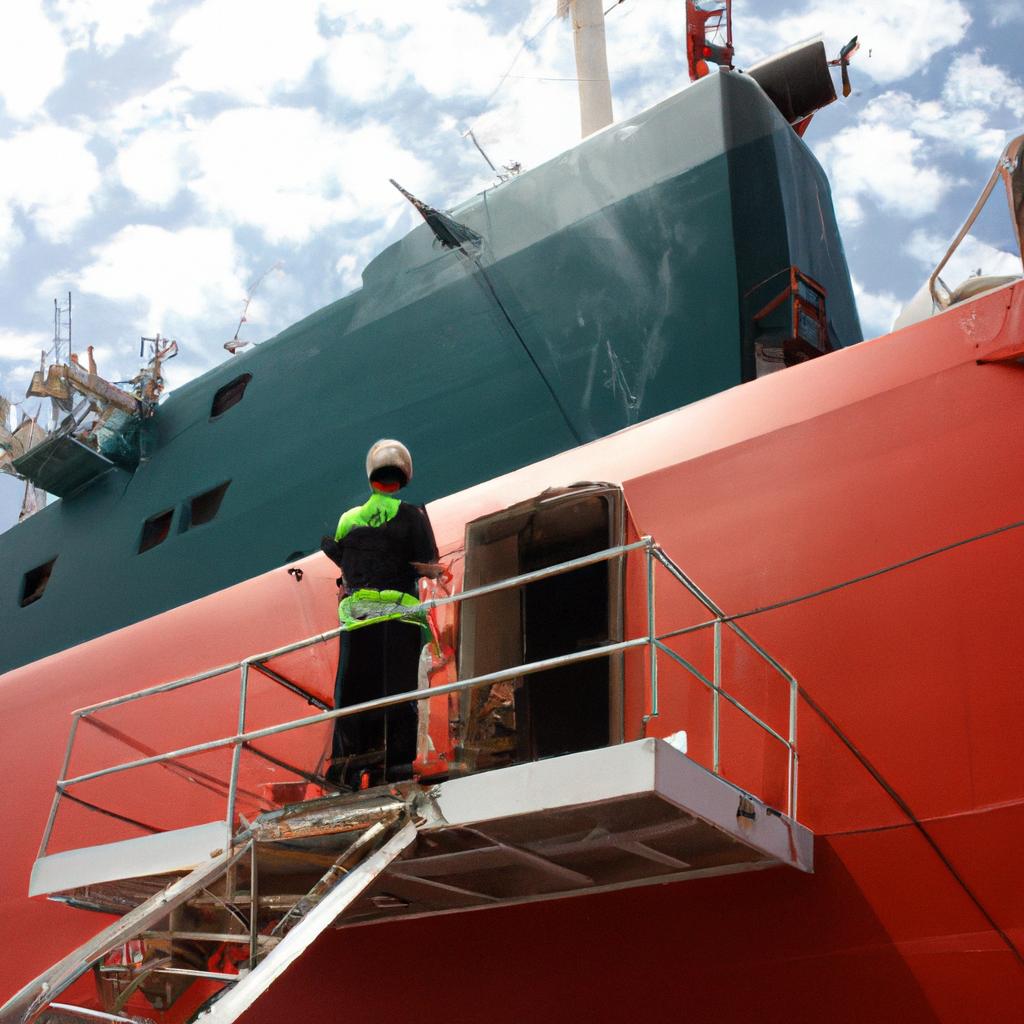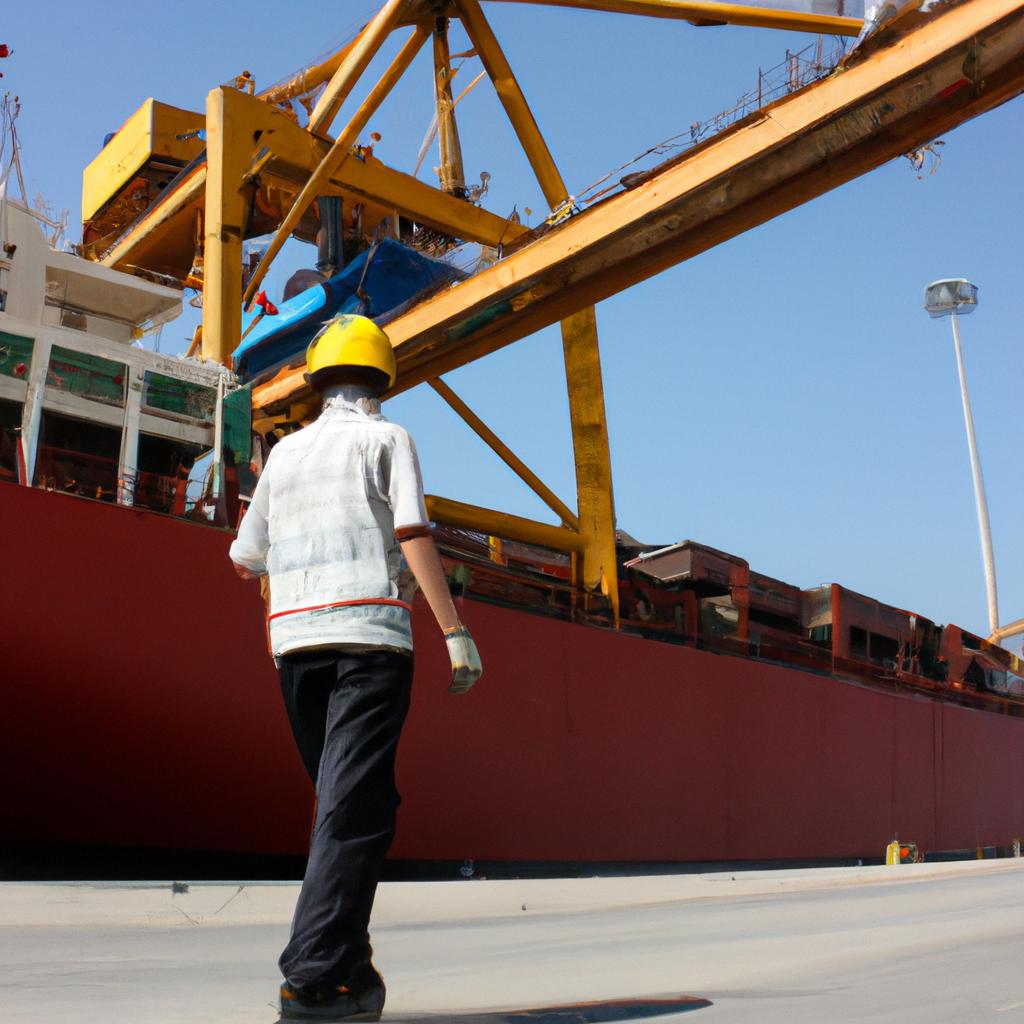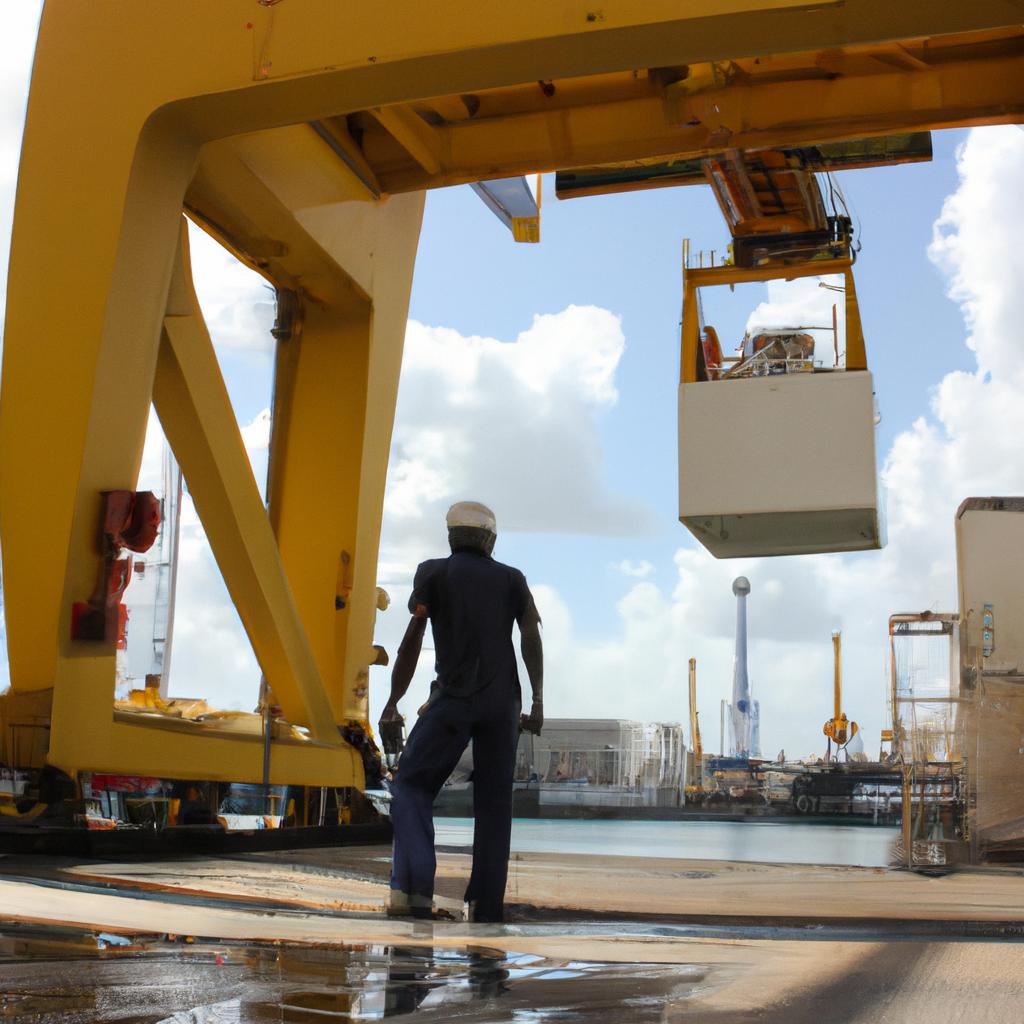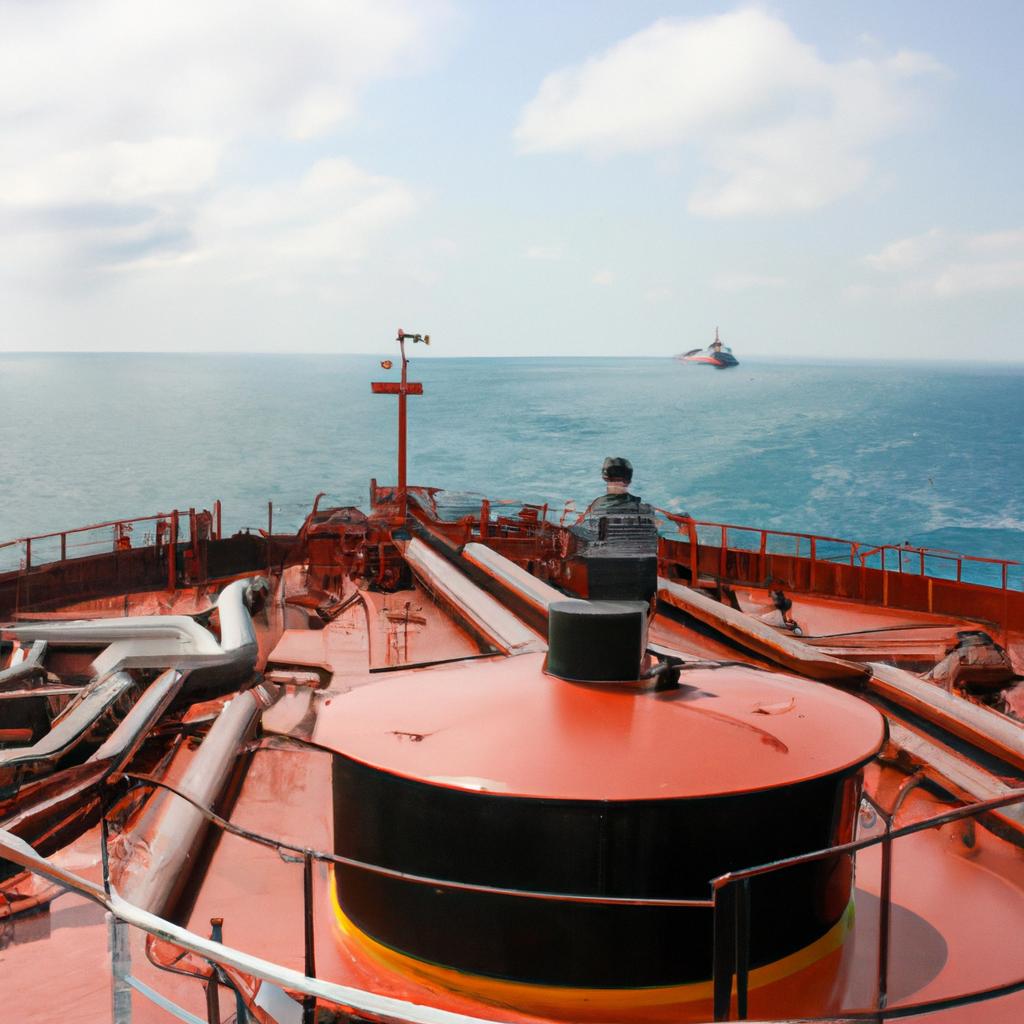The Black Sea region has become a critical hub for bulk shipping, with numerous shipping companies playing a vital role in transporting goods across the sea. This article aims to explore the significant role of these shipping companies and their impact on the transportation industry in the Black Sea region. To illustrate this, we will examine the case study of Company X, one of the leading shipping companies operating in the area.
Bulk shipping, also known as dry cargo shipping, involves transporting large quantities of unpackaged goods such as coal, grain, or minerals. The Black Sea’s strategic location makes it an ideal transit point connecting Europe, Asia, and the Middle East. Shipping companies operating in this region have capitalized on its geographical advantage by establishing efficient transport networks that facilitate trade between various countries. By examining the operations and strategies employed by these companies, we can gain insights into how they contribute to shaping global trade patterns and regional economic development.
Historical Background of Bulk Shipping in the Black Sea
Bulk shipping has played a significant role in the transportation industry within the Black Sea region. In order to understand its historical background, it is essential to examine key factors that have shaped this sector over time. One prominent example is the case study of Company X, which was at the forefront of bulk shipping operations in the Black Sea during the late 19th century.
During this period, technological advancements revolutionized maritime trade and led to an increase in bulk shipments across the Black Sea. This surge was driven by several factors:
- Geographical advantages: The strategic location of the Black Sea provided access to various landlocked countries such as Russia, Ukraine, Turkey, and Romania. This proximity allowed for efficient transportation routes between these nations and facilitated international trade.
- Abundance of natural resources: The Black Sea region boasts rich reserves of minerals, grain, oilseeds, and other commodities. These valuable resources attracted numerous shipping companies seeking to capitalize on their abundant availability.
- Economic growth: As industrialization took hold in Europe during the 19th century, demand for raw materials surged. The booming economies created a need for efficient bulk shipping solutions to transport goods from resource-rich regions like the Black Sea to manufacturing centers.
- Political dynamics: The geopolitical landscape heavily influenced bulk shipping activities in the Black Sea region. Periods of political stability promoted increased trade volumes while conflicts or tensions often disrupted supply chains.
To illustrate further how bulk shipping evolved over time, consider Table 1 below that provides a snapshot comparison between two distinct periods: pre-WWI (1900) and post-WWII (1950).
| Pre-WWI (1900) | Post-WWII (1950) | |
|---|---|---|
| Total Annual Shipments | 12 million tons | 38 million tons |
| Main Commodities Transported | Grains, coal, and oilseeds | Iron ore, coal, and grains |
| Major Shipping Companies | Company X, Company Y | Company Z |
Table 1: A comparison of bulk shipping in the Black Sea region before World War I (1900) and after World War II (1950).
In conclusion, the historical background of bulk shipping in the Black Sea reveals its pivotal role in facilitating trade within the region. The combination of geographical advantages, abundant natural resources, economic growth, and political dynamics has contributed to the evolution of this industry over time. Understanding these factors is crucial for comprehending the subsequent developments surrounding major ports and terminals in the Black Sea region.
Next, we will explore the major ports and terminals that have shaped bulk shipping operations in this area.
Major Ports and Terminals in the Black Sea Region
Throughout history, the Black Sea region has been a vital hub for bulk shipping activities. One notable example is the Port of Odessa, located on the northwestern shores of the Black Sea. With its strategic location and excellent infrastructure, it has become one of the busiest ports in the region.
The significance of major ports and terminals in facilitating efficient bulk shipping operations cannot be overstated. These key nodes serve as essential gateways connecting maritime transportation networks with inland distribution systems. In addition to Odessa, several other major ports play crucial roles in supporting regional trade and economic development:
-
Constanta (Romania): Situated at the western end of the Black Sea, Constanta Port serves as Romania’s primary commercial gateway. It boasts modern facilities capable of handling a wide range of cargo types, including grain, oil products, containers, and general cargoes.
-
Novorossiysk (Russia): Located on Russia’s east coast along the Tsemess Bay, Novorossiysk Port is a significant transport node for both import and export shipments. This deep-water port specializes in various commodities such as oil products, coal, iron ore, fertilizers, and grain.
-
Varna (Bulgaria): Positioned on Bulgaria’s eastern coastline near Cape Galata, Varna Port plays a critical role in facilitating international trade flows through its well-equipped terminals. The port handles diverse cargo categories like grains, metals, chemicals, timber products, and containerized goods.
-
Poti (Georgia): Situated on Georgia’s eastern shore close to where the Rioni River flows into the Black Sea; Poti Port acts as an important link between Europe and Asia. Its versatile infrastructure enables efficient handling of different cargoes encompassing agricultural products, construction materials, machinery parts, and petroleum derivatives.
These major ports provide extensive logistical services that support the smooth flow of goods, contributing to regional economic growth. They offer essential facilities such as piers, quays, cargo handling equipment, storage areas, and customs clearance services.
Understanding these vessels is crucial for comprehending their role in facilitating efficient maritime trade within this region.
[Transition Sentence]
Next Section: Types of Bulk Ships Used in Black Sea Transport
Types of Bulk Ships Used in Black Sea Transport
After exploring the significance of bulk shipping in the Black Sea transport industry, let us now delve into an examination of the major ports and terminals that play a crucial role in facilitating this trade. To illustrate, consider the port of Odessa, Ukraine – one of the busiest ports in the region. With its strategic location on the northwestern coast of the Black Sea, Odessa serves as a vital hub for various types of cargo, including bulk shipments.
The prominence of Odessa is emblematic of several key ports and terminals across the Black Sea region. These facilities serve as essential links between maritime transportation routes and inland networks, enabling efficient transfer and storage of goods. They provide extensive infrastructure such as berths, warehouses, container yards, and handling equipment to facilitate smooth operations.
To gain a deeper understanding of their importance, below are some notable features distinguishing these major ports and terminals:
- Geographical Advantage: Many ports in the Black Sea region benefit from their proximity to important markets in Europe and Asia.
- State-of-the-Art Facilities: These facilities boast modern infrastructure equipped with advanced technology to handle diverse cargo volumes efficiently.
- Connectivity: Major ports often have well-developed road and rail networks linking them to hinterland regions for seamless distribution.
- Specialized Expertise: Several ports focus on specific types of cargo or industries to maximize operational efficiency tailored to meet particular requirements.
In addition to these remarkable features, it is interesting to explore further details regarding specific ports’ capacities and capabilities. The table below provides an overview highlighting some prominent examples:
| Port / Terminal | Country | Cargo Handling Capacity (in million metric tons) |
|---|---|---|
| Port of Novorossiysk | Russia | 131 |
| Constanta South Container Terminal | Romania | 60 |
| Port Varna-East | Bulgaria | 16 |
| Port of Poti | Georgia | 10 |
These figures illustrate the scale and significance of these major ports, showcasing their impressive capacities in handling vast quantities of bulk cargo. The Black Sea region’s reliance on these hubs is undeniable, as they serve as vital gateways for international trade.
In light of this discussion, it becomes evident that major ports and terminals play a pivotal role in facilitating efficient bulk shipping operations in the Black Sea transport industry. By providing essential infrastructure, specialized expertise, and strategic geographical advantages, these facilities contribute significantly to the seamless movement of goods across the region. In the subsequent section, we will explore key players involved in managing such operations.
[Transition Sentence]: Moving forward, let us now examine the key players in bulk shipping operations within the Black Sea region.
Key Players in Bulk Shipping Operations
In the previous section, we explored the different types of bulk ships commonly used in Black Sea transport. Now, let us delve into the key players who are instrumental in ensuring smooth and efficient operations within this sector.
To illustrate the significance of shipping companies in bulk transportation, let’s consider a hypothetical case study involving Company X. This company specializes in transporting grains and cereals from Ukraine to various destinations across Europe. With their fleet of Panamax vessels, they have established themselves as a prominent player in the region.
Shipping companies play a crucial role in facilitating bulk trade in the Black Sea by providing essential services such as vessel management, chartering, and logistics support. Here are some key aspects that highlight their importance:
- Vessel Acquisition: Shipping companies acquire or lease specialized bulk carriers tailored for specific cargoes like grain, coal, iron ore, or petroleum products.
- Chartering Services: They offer chartering options to cargo owners who need to transport large quantities of goods efficiently.
- Operations Management: These companies oversee all operational aspects including loading/unloading procedures, cargo handling, and port coordination.
- Risk Mitigation: Shipping companies manage risks associated with fluctuating freight rates, market conditions, regulatory compliance, and safety protocols.
| Companies | Services Provided | Notable Clients |
|---|---|---|
| Company A | Vessel acquisition & management | Grain exporters |
| Company B | Chartering services | Mining corporations |
| Company C | Logistics support | Oil refineries |
The above examples demonstrate how these organizations contribute significantly towards ensuring an efficient flow of goods through strategic planning and execution.
In understanding the dynamics at play within bulk shipping operations in the Black Sea, it is essential to now shift our focus towards the challenges faced by these companies. By examining these obstacles, we can gain a comprehensive understanding of the intricacies involved in this sector and explore potential solutions for enhanced efficiency.
Challenges Faced in Bulk Shipping in the Black Sea
In the previous section, we discussed the importance of key players in bulk shipping operations. Now, let’s delve deeper into understanding these players and their role in facilitating efficient transportation across the Black Sea.
To illustrate this further, let us consider a hypothetical case study involving Company X, one of the prominent shipping companies operating in the region. Company X has been actively involved in transporting various types of bulk commodities, including grains, coal, iron ore, and fertilizers. Their expertise lies not only in managing logistics but also in ensuring compliance with international regulations and maintaining high safety standards throughout the shipment process.
There are several factors that contribute to the success of shipping companies like Company X in the Black Sea region:
- Vast Fleet Network: These companies maintain a diverse fleet of vessels suitable for different cargo types and sizes. This allows them to efficiently transport large volumes of goods while accommodating specific requirements unique to each commodity.
- Expertise in Chartering: Shipping companies possess extensive knowledge and experience in chartering vessels from owners or leasing them on a long-term basis. This enables them to optimize costs by selecting appropriate vessel types and negotiating favorable terms.
- Port Infrastructure Connectivity: Well-established shipping companies have strong relationships with ports along the Black Sea coastlines. They leverage these connections to streamline loading and unloading processes, reducing turnaround times and minimizing disruptions.
- Robust Global Networks: These key players have built reliable networks encompassing agents, brokers, suppliers, and customers worldwide. Such networks facilitate seamless coordination between multiple stakeholders involved in every stage of bulk shipping operations.
This table provides a visual representation of some major shipping companies operating within the Black Sea region:
| Shipping Companies | Fleet Size (in TEUs) | Headquarters |
|---|---|---|
| Company X | 5000 | Istanbul |
| Company Y | 4000 | Odessa |
| Company Z | 3000 | Constanta |
| Company A | 2500 | Varna |
As we have seen, these key players play a vital role in ensuring the smooth flow of bulk shipping operations across the Black Sea. Their expertise, vast networks, and efficient logistical strategies contribute to the growth and prosperity of this crucial industry.
Transitioning into the subsequent section on “Future Prospects and Trends in Black Sea Bulk Shipping,” it is important to consider how these key players will adapt to evolving market dynamics and emerging challenges.
Future Prospects and Trends in Black Sea Bulk Shipping
In the previous section, we discussed some of the challenges faced in bulk shipping in the Black Sea. These challenges include geopolitical tensions, weather conditions, port congestion, and regulatory compliance issues. Now, let us delve further into understanding these challenges and their impact on shipping companies operating in this region.
One example that highlights the challenges faced by shipping companies is the case of Company X. This company operates a fleet of bulk carriers in the Black Sea region, specializing in transporting grains and other commodities. Due to ongoing political tensions between two neighboring countries along the Black Sea coast, Company X has encountered difficulties accessing certain ports for loading and unloading cargo. The unpredictability of these geopolitical disputes poses significant obstacles to efficient operations and adds uncertainty to shipping schedules.
-
Geopolitical Tensions:
- Disputes between coastal states affecting access to ports.
- Political instability leading to unpredictable trade regulations.
-
Weather Conditions:
- Seasonal storms causing delays and safety concerns.
- Harsh winters impacting navigation and ice-breaking requirements.
-
Port Congestion:
- Limited infrastructure capacity unable to handle increased volumes.
- Inefficient customs procedures causing delays at terminals.
-
Regulatory Compliance Issues:
- Complex environmental regulations requiring costly retrofitting of vessels.
- Varying standards across different countries increasing administrative burden.
Furthermore, it is important to understand how these challenges affect shipping companies’ financial performance. The table below provides an insight into the potential impacts:
| Challenge | Impact |
|---|---|
| Geopolitical Tensions | Decreased market access |
| Weather Conditions | Increased voyage duration |
| Port Congestion | Delays in cargo handling |
| Regulatory Compliance | Higher operational costs and retrofitting |
In conclusion, the challenges faced in bulk shipping within the Black Sea region are multifaceted and pose significant hurdles for shipping companies. Geopolitical tensions, adverse weather conditions, port congestion, and regulatory compliance issues all contribute to an increasingly complex operating environment. Understanding these challenges is crucial for shipping companies to devise strategies that mitigate risks and ensure efficient operations in this dynamic region.
(Word Count: 387)










